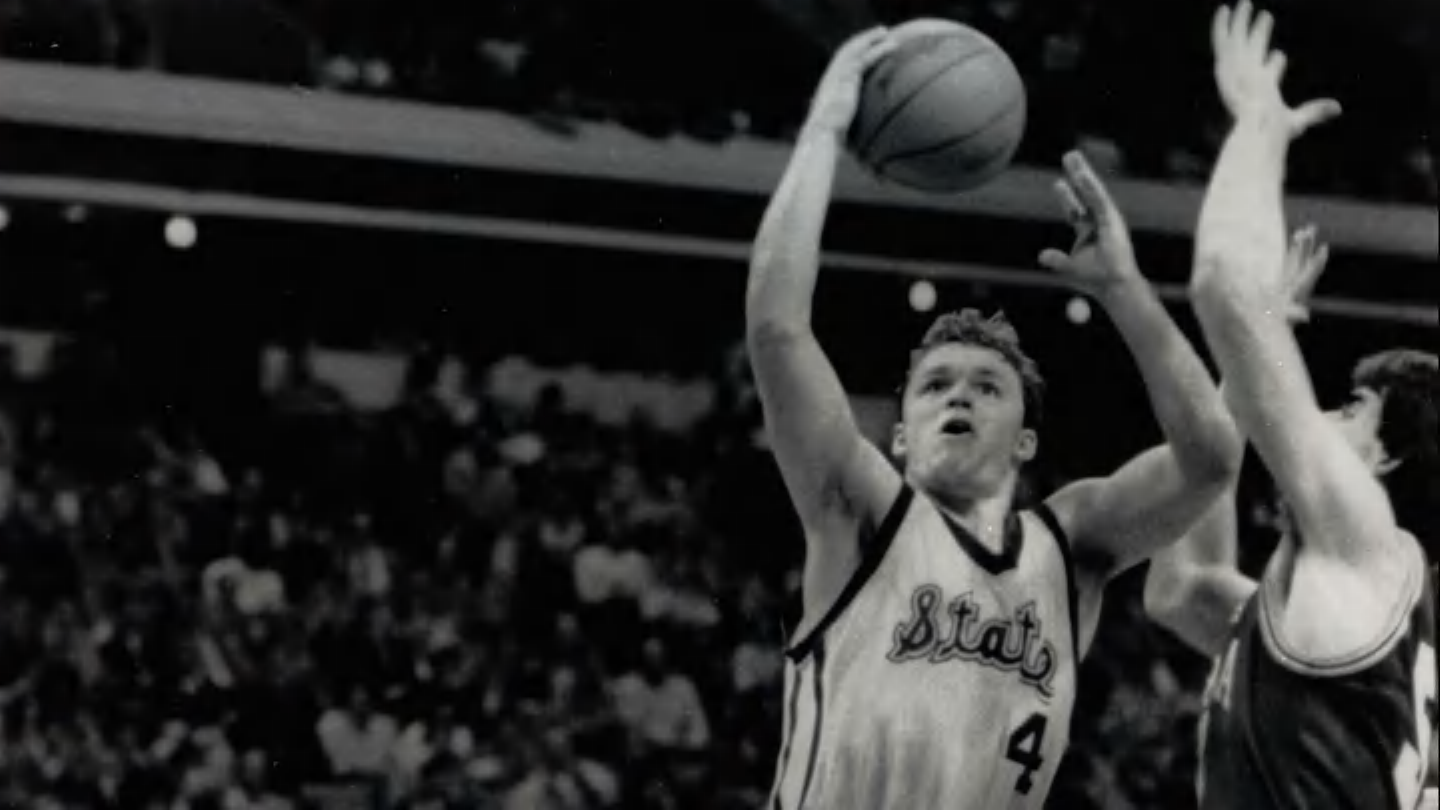— Reporting from Milwaukee
Friends and neighbors of Samuel Sharpe grapple with his death after police shooting near RNC

“The police will try to remove this, but I won’t let them,” 83-year-old Jeanne told a passing man.
Sam, as he was called, had been living in this backyard camp near King Park on the west side of Milwaukee, where a dozen more tents had recently been set up on a strip of dirt and grass. Empty beer cans, broken umbrellas, shopping carts and an old mattress were lying around everywhere.
On Tuesday afternoon, 43-year-old Sam was shot dead by Ohio police officers who had come to the city to assist the police during the Republican National Convention in Milwaukee. A group of 13 police officers were chatting on the street when they spotted two men in a standoff in the park named after the Reverend Martin Luther King Jr.
“He has a knife,” an officer said abruptly, referring to Sam. according to police camera footage. “Yes, he does.”
The officers yelled at Sam as they ran toward him from about 50 feet away, but it’s unclear if Sam ever heard or understood their commands from that distance.
Then five of the officers opened fire and Sam was dead.
Rats crawled in and out of Sam’s tent, where Jeanne was sitting on Wednesday.
Until November, Sam had lived in his mother’s house in Milwaukee. He had always been a mama’s boy, said his sister Angelique Sharpe, and he suffered from advanced multiple sclerosis. But Sam felt called to share the Bible with people living on the margins of society. He said that was the example Jesus had set. And so he went, said Angelique, and made the tent his home.
The rodents had taken over the camp and were terrorizing the other residents. At night, the pests gnawed through the tents and crawled fearlessly over people sleeping without blankets. Jeanne was unfazed, or perhaps content, as they approached her arm, which still had a hospital bracelet on it after she had recently been beaten by a drunken man. A cut on her arm was blue and yellow with infection.
“You can’t sleep here,” a woman who also lived in the camp told Jeanne. “The rats will attack you again.”
Her name was Alice Tyler, 55. She had worked as a home care worker before her partner was diagnosed with brain cancer, and after his death her job became extremely difficult. Now she lived here.
“Go away!” Jeanne said sharply.
“I’m just telling you,” said Alice, “that you don’t know what these rats are carrying around with them.”
Across a small strip of woods, Alice overheard a conversation between two men, Raheem Burks and Robert Camacho, who didn’t live at the camp but were often in the area to help. They had known Sam, as far as anyone could be known out here, and both were still coming to terms with what the murder meant.
Robert was well known among the homeless in the area because he often provided water and tents to those in need. Sam was a devout Jehovah’s Witness. They sometimes studied the Bible together.
Alice now shared that Sam had confided in her that he had spent time in prison. In the early 2000s, when he was still a young adult, he was convicted of armed robbery. During those years in prison, he found guidance and direction in the Word of God.
“He tried,” said Alice.
“Falling is not failure, failure is staying down,” Raheem said now.
“Everything became overwhelming,” said Alice.
“He started a completely new life,” said Robert.
Alice could relate; she had been in prison herself, she said, and remembered feeling abandoned by family, friends and society. Sam didn’t talk to other people about the private aspects of his life, she said, except for his deep Christian faith. That was the light that guided him to the person he wanted to be, and that’s the person Alice knew.
Sam’s father, for whom he was named, instilled in Sam his deep faith in God, Angelique said. The elder Samuel, who has died, was drafted into the Vietnam War. His example as a “veteran who fought for our country where he wasn’t even allowed to share a water cooler with his fellow soldiers,” Angelique said, was a source of pride for the family.
Sam’s incarceration was a low point in his life, she said, but he had changed.
“Who gets convicted and who gets clemency?” Angelique wondered. “Look at Trump. Look at Trump. They’re trying to give him clemency so he can be president again. Sam was 20 when this (arrest) happened.”
Behind Alice, rats ran back and forth between the tents and trees.
The residents of the camp described to each other all the stress Sam had been through in the days leading up to the confrontation with the other man, who they said was Antonio.
According to other residents of the camp, Sam’s dog had recently become ill from rat poison and suffered greatly from his illness in the last days of his life.
He was also becoming increasingly concerned about his own safety. Sam had even called his mother and sister because he was desperate because the man had threatened to kill him and his dog and set fire to his tent. Sam had started talking to himself more than usual.
Milwaukee had been hit by a heat wave, temperatures rose above 30 degrees, which made everyone nervous and the rats even more aggressive.
“This guy was bothering him and harassing him. He was hacking and stealing and he had to defend himself. This guy was more aggressive than him,” Alice told Robert. “He felt he had to defend himself. He weighed 52 kilos, wet. He had health problems.”
Behind the trees, Jeanne was still sitting and looking around Sam’s tent.
Jeanne remembered that he had invited her to sleep on the old leather couch in front of his tent because she didn’t have one of her own. He had put it there to keep out the wind.
“I don’t think anyone will show up,” Jeanne said, although she wasn’t sure who she was waiting for.
Modern political conventions officially kick off the presidential election in America, but in reality they are spectacles that exist largely to attract media coverage. Journalists and political elites dutifully flock to the convention cities, where they wall themselves off within a heavily guarded perimeter. There they question the candidate’s message, gauge the mood of party leaders, and debate how one party’s unity will hold up in the face of the other’s division.
Outside the restricted area in Milwaukee – where security measures were tightened after the assassination of former President Trump – residents complained of disrupted bus services, small tips on large checks and nightmarish traffic delays.
The tent city in which Sam lived was not only outside the assembly area, but also outside of society.
That police officers from other cities were nearby Many residents in the area were shocked that there were any at all, and expressed disbelief as Milwaukee police defended their actions. “This is a situation where someone’s life was in immediate danger,” Milwaukee Police Chief Jeffrey Norman told reporters, adding that officers were sent to the area in case of protests. “These officers, who are not from this area, took it upon themselves to act today to save someone’s life.”
Robert, who worked with the homeless in the Milwaukee area, remembered that there used to be many tents in MacArthur Square, just south of the Fiserv Forum.
As the city prepared for the convention, he reported, the homeless were gradually pushed further and further away from the convention area. And to drive out many of the homeless, new tent camps were set up with people who did not know each other.
“I don’t understand why they sent the Ohio State Police here when we’re here in Milwaukee,” Robert said. “They should have put the police at the Fiserv Center and not here. The city protects the city.”
“They could have used their damn taser thing,” Alice said.
“I understand that, but they were there for the police,” Raheem said, turning their heads towards him.
Raheem Burks, 54, sometimes volunteered as a security guard at the nearby social service organization Repairers of the Breach. There he met Alice and they became friends. Now he stopped by her house from time to time to check on her.
“Okay, stop, you said one word too many,” Alice said. “You’re making it look like they had every right to be out here shooting.”
“I’m not saying the whole shooting of the guy was right. What I’m saying is they have the authority to do it,” Raheem said.
“They’re here visiting,” Alice said of the police. “Go over to where Trump is. What are you doing here shooting people?”
Elsewhere in Milwaukee, Sam’s family was also grappling with his death. Police had shown up at Sam’s mother’s home with a photo of him hooked up to a ventilator and had asked for positive identification.
Police said they recovered two knives from the scene. People in the tent city agreed that Sam had the knives for self-defense. His family and friends were prepared for the speculation that would circulate online after a black man was shot and killed by police.
“We live in a country where everyone is supposed to carry a gun for their own protection, but Sam can’t carry a knife when someone is threatening his life?” complained Sam’s sister Angelique.
Jeanne was still sitting outside Sam’s tent late Wednesday afternoon when another of Sam’s family members came by and introduced themselves. She was looking for answers as to what had led Sam to pull a knife on someone. It seemed so out of character for him.
“He was the kind of person who cared about others,” Jeanne said, not answering her question about whether she knew what happened. “I thought it was that other guy who beat me up; he’s the one they should have shot.”
The expression on his family member’s face showed resignation; she would not get any answers here.
A vigil was planned for the next day in the city center by activists seeking to draw attention to the shooting, which some called “the next George Floyd.”
A makeshift memorial of flowers, notes and protest signs was set up on the corner where Sam was shot.
Here, in the alley where Sam lived, the news cameras had disappeared and never returned, and all that was left of him was his tent.
Molly Hennessy-Fiske and Aaron Schaffer contributed to this report.



